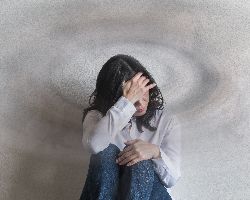Health library
Back to health libraryI'm so dizzy

Dizziness is a common complaint that can sometimes cause serious problems. With a bit of detective work, you and your doctor can likely find a way to relieve it.
Feeling dizzy, light-headed or like you're about to lose your balance is an unpleasant sensation. In fact, dizziness is one of the most common reasons people go to the doctor.
It may take a bit of sleuthing, however, for your doctor to find out the cause of your dizziness. That's due in part to the many different sensations that people describe as dizziness.
Defining dizziness
People often use the term dizziness to describe feeling faint, light-headed, unsteady, or that the world is spinning or tilting.
If you feel woozy, light-headed or like you're about to faint, you may have done something that suddenly reduced blood flow to your brain. For example, if you get up out of a chair too quickly, you may experience dizziness.
Dizziness, light-headedness or feeling unsteady may also result from hyperventilation, medications or anxiety.
Sometimes there are other, more serious causes of dizziness, which can be diagnosed by your doctor. If you have unexplained dizziness, it's a good idea to make a doctor's appointment.
Dizziness also can be a sign of stroke, which is a medical emergency.
Vertigo
If you have vertigo—the sense of motion when your body is physically at rest—you may also say you feel dizzy.
With vertigo, you may feel as though things are spinning around you or that your world is tilting. You may also think you are moving when you are sitting or lying still.
Your balance center
Vestibular disorders—problems with the inner ear—are a common cause of balance problems such as dizziness and vertigo. The part of your inner ear called the labyrinth helps you maintain your balance.
The labyrinth is made up of three canals, which are filled with fluid. Tiny hairs line the canals and sense the movement of the fluid inside the ear. The hairs send messages to the brain about the position of the head.
The inner ear also helps regulate posture and the way we move from place to place, and it helps us know where we are in relationship to the objects around us, says the National Institute on Deafness and Other Communication Disorders.
If your inner ear gives your brain mixed messages about whether or not you are moving, or whether or not the world around you is moving, you may get vertigo.
Common balance disorders
Benign paroxysmal positional vertigo (BPPV). Some people have a problem in their inner ear that causes sudden dizziness when the head is moved in a certain direction or when turning over in bed.
BPPV is the most common vestibular disorder. If you have BPPV, you may feel as though the room is spinning in circles when you try to get out of bed or if you simply turn over. Some people feel sick to their stomach at the same time. These symptoms usually go away in a few seconds.
BPPV is an inner ear problem. It can happen at any age, but it is most common among older adults. According to the American Academy of Family Physicians, the tiny calcium particles that help you keep your balance can clump together in one canal instead of remaining evenly distributed. This affects how the inner ear detects the position of your head.
BPPV is annoying, but it won't really harm you. Your doctor may suspect BPPV if you get dizzy when you move your head in certain ways. Tests can help your doctor know whether your dizziness is caused by BPPV.
If you have BPPV, your doctor can teach you some head movements that move the debris that cause the problem. The movements can stop the symptoms and may keep the dizziness from coming back. Your doctor may also prescribe medication to treat the dizziness and nausea.
Ménière's disease. This is an inner ear problem that causes dizziness, a spinning sensation, hearing loss and ringing in the ears.
Labyrinthitis. This may cause nausea and a spinning sensation caused by an inflammation of the bony part of the inner ear. The episodes of dizziness and spinning sensations can come and go but usually don't cause long-term problems.
Other causes of dizziness
According to the Vestibular Disorders Association, dizziness and resulting balance problems may also be caused by the following:
- A viral infection, such as a head cold, the flu or meningitis.
- A blow to the head or ear.
- Atmospheric pressure changes.
- Some common prescription and over-the-counter drugs.
- Alcohol.
Light-headedness may be caused by:
- Dehydration.
- Complications of diabetes.
- Blood pressure problems.
Reviewed 2/4/2025